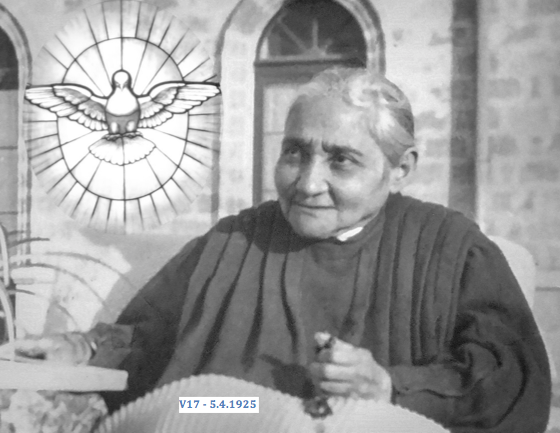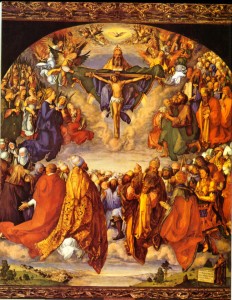November 1st we commemorate all the Saints – the heroic women and men who followed Christ faithfully during their lifetimes and who are now with God in Heaven. We ask all the Saints to intercede for us, so that we also will achieve sanctity and reach the goal of our existence.
***
The veneration of the Saints began with the death of the first martyrs of the Christian era. The cult of the Martyrs in later centuries incorporated also the cult of the Apostles, Bishops and ascetics, and religious of both sexes. Emperor Constantine the Great (+337) built a Church in Cnstantinople in memory of the Twelve Apostles.
Before long, the cult of the New Testament Saints was extended to include that of the Old Testament Saints. St. Cyril of Jerusalem (+386) in his fifth Mystagogical Catechesis attests that during the Divine Liturgy after the consecration “we commemorate those who have fallen asleep before us, first, patriarchs, prophets, apostles, and martyrs, so that through their prayers and intercession, God may receive our petition. Afterwards, we commemorate the Holy Fathers and bishops who have fallen asleep before us….” Some of these Saints also have a special day of their own dedicated to them during the year.
Our Church Calendar dedicates days in the year to one or more Saints or Classes of Saints. There are multitudes of Saints in Heaven whose names are not recorded in the Church Calendar and whose names are unknown to the world even though they are forever inscribed in the Book of Life. Therefore,it is the wish of Holy Church that fitting honor be paid to both the known and unknown Saints in Heaven. The first class of Saints to be so honored are the Holy Martyrs. The feast of All Martyrs was kept in the Greek Church during the time of St. John Chrysostom (+407). A eulogy in their honor delivered by him on the first Sunday after Pentecost remains extant. “Seven days had not passed,” he says, ” since we celebrated the holy feast of Pentecost, and once again the choir of martyrs received us, the faithful warriors and army, who do not yield to the army of angels, whom Jacob had seen, but are equally zealous and equal to them.”
The earliest Syrian calendar (411) commemorates all martyrs on the Friday after the feast of the Resurrection. The Calendar of the Chaldean Catholics and Syrian Nestorians on that same day commemorates All Confessors. In the fourth century in Edessa, (modern Turkey), the feast of All Martyrs was celebrated on the 13th of May. St. Ephrem the Syrian (+373) composed a special hymn for this day in honor of the Martyrs.
The Western Church keeps the feast of All Saints on the first of November. In the West as we all as in the East, the feast of all Martyrs was first to be observed and it was kept at different times by the Latin Churches in various countries. St. Maxim of Turin (5c) has left a sermon in honor of All Martyrs that was delivered on the first Sunday after Pentecost. In 609 or 610 Pope Boniface IV received the Roman Pantheon from Emperor Phocas and dedicated it to the most Pure Virgin Mary and the martyrs on the 13th of May. From that time on, the anniversary of this deication was celebrated annually with great solemnity. Some believe this marks the origin of the feast of All Saints.
Pope Gregory III (731-741) dedicated a chapel in the Basilica of St. Peter in honor of All Saints. The date of this dedication is unknown, but it is known that from that time on, certain countries began to celebrate the Feast of All Saints on the first day of November. Sometime in the ninth or tenth century, the West began to celebrate the first of November as the Feast of All Saints universally. Pope Gregory VII (1073-1085) finally transferred the Feast of All Saints to the first of November.

